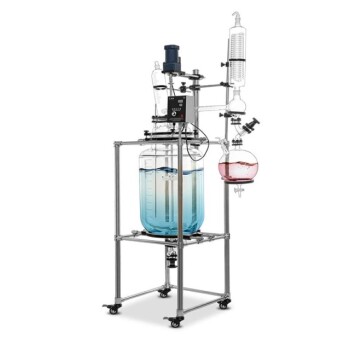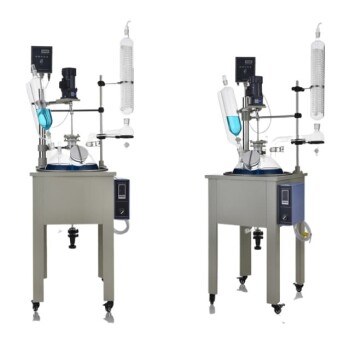Rotary evaporators are versatile laboratory instruments primarily used for the efficient and gentle removal of volatile solvents from liquid mixtures through evaporation under reduced pressure. They are widely employed in various fields, including medicinal chemistry, pharmaceuticals, chromatography, petrochemicals, and food science. Key applications include solvent recovery, sample concentration, purification of compounds, extraction of essential oils, and preparation of samples for further analysis. Rotary evaporators are particularly valued for their ability to handle heat-sensitive materials and complex mixtures, making them indispensable in research, industrial, and pharmaceutical settings.
Key Points Explained:

-
Distillation and Separation:
- Rotary evaporators are primarily used for continuous distillation of volatile solvents under reduced pressure. This process is essential in separating and purifying compounds such as solvents, inorganic salts, and acids.
- They are widely used in chemical, industrial, and biological medicine fields for distillation, separation, and purification of complex mixtures.
-
Sample Concentration:
- One of the most common uses of rotary evaporators is to concentrate samples by removing solvents or unwanted substances. This is critical in preparing samples for further analysis, such as in drug development or chemical research.
- The gentle evaporation process ensures that heat-sensitive materials are not degraded, making it ideal for biological and pharmaceutical applications.
-
Solvent Recovery:
- Rotary evaporators are used to recover solvents from mixtures, which is both cost-effective and environmentally friendly. This is particularly important in industrial and pharmaceutical settings where large volumes of solvents are used.
-
Extraction of Essential Oils and Natural Products:
- These devices are commonly used to extract essential oils from plants and natural sources. The controlled evaporation process helps retain the volatile aromatics and active compounds in the extracts.
- Applications include the extraction of CBD in the industrial field and the concentration of plant extracts for use in pharmaceuticals and cosmetics.
-
Preparation of Samples for Analysis:
- Rotary evaporators are used to prepare samples for further analysis, such as in chromatography or drug development. By concentrating and purifying samples, they ensure accurate and reliable results in analytical processes.
-
Applications in Pharmaceuticals and Biopharmaceuticals:
- In the pharmaceutical and biopharmaceutical industries, rotary evaporators are used for concentration, crystallization, drying, separation, and solvent recovery. They are particularly suitable for handling biological products that are sensitive to high temperatures.
- Examples include the purification of biological products and the preparation of heat-sensitive compounds for drug formulation.
-
Versatility Across Industries:
- Rotary evaporators are used in a wide range of industries, including chemical, pharmaceutical, food science, and molecular cooking. Their ability to handle diverse applications makes them a staple in laboratories worldwide.
- For instance, they are used in molecular cooking for non-heat evaporation to retain volatile aromatics and in food science for extracting water from juices.
-
Gentle and Efficient Evaporation:
- The rotary evaporator's design allows for gentle and efficient evaporation of solvents, making it ideal for heat-sensitive materials. This is achieved through the use of reduced pressure and controlled temperature conditions.
- This feature is particularly valuable in organic laboratories, where maintaining the integrity of compounds during evaporation is crucial.
-
Handling Complex Mixtures:
- Rotary evaporators are capable of handling complex mixtures, making them suitable for applications such as the purification of plant extracts, essential oils, and chemical substances.
- Their ability to separate and purify compounds from complex mixtures is essential in research and industrial processes.
-
Environmental and Economic Benefits:
- By enabling solvent recovery and reducing waste, rotary evaporators contribute to more sustainable laboratory practices. This is particularly important in industries where large volumes of solvents are used.
- The ability to recover and reuse solvents also provides economic benefits by reducing material costs.
In summary, rotary evaporators are indispensable tools in modern laboratories, offering a wide range of applications from distillation and solvent recovery to the extraction of essential oils and preparation of samples for analysis. Their versatility, efficiency, and ability to handle heat-sensitive materials make them essential in fields such as pharmaceuticals, chemistry, and food science.
Summary Table:
| Application | Key Use Cases |
|---|---|
| Distillation & Separation | Purification of solvents, inorganic salts, and acids from complex mixtures. |
| Sample Concentration | Preparation of samples for drug development and chemical research. |
| Solvent Recovery | Cost-effective and eco-friendly recovery of solvents in industrial settings. |
| Essential Oil Extraction | Extraction of CBD, plant extracts, and volatile aromatics for pharmaceuticals. |
| Sample Preparation | Concentrating and purifying samples for chromatography and analytical processes. |
| Pharmaceuticals | Handling heat-sensitive biological products for drug formulation and purification. |
| Versatility Across Fields | Applications in food science, molecular cooking, and chemical industries. |
| Environmental Benefits | Reducing waste and enabling solvent reuse for sustainable lab practices. |
Enhance your lab's efficiency with rotary evaporators—contact our experts today to learn more!














